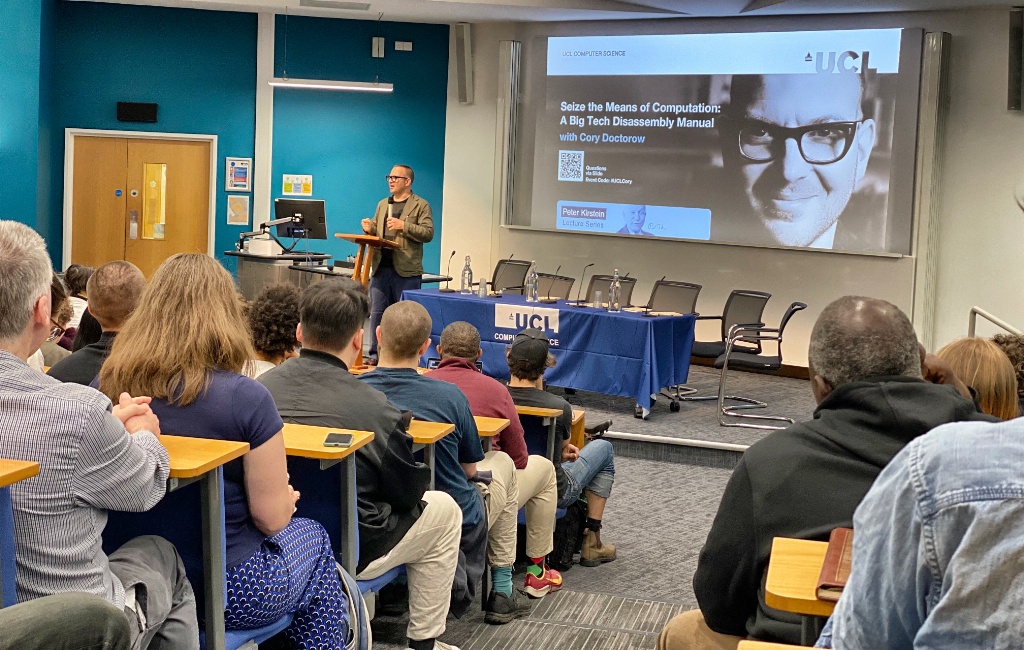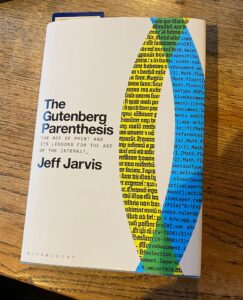An arboreal puzzle
On a walk the other day we came on a tree which seemed to be encased in fine white wool and wondered what it was. My guess: pussy willow; but what I know about plants could be written in 95-pt Helvetica Bold on the back of a postage stamp.
Quote of the Day
“I always say beauty is only sin deep.”
- Saki (H.H. Munro)
Musical alternative to the morning’s radio news
Vaughan Williams | Fantasia on Greensleeves
Music for a bucolic moment, ne c’est pas?
Long Read of the Day
Blood and the Machine
John Ganz on the swerve in Silicon Valley towards what he calls Reactionary Modernism.
Last April, I wrote that we were witnessing the tech capitalist class’s turn to reactionary politics. This was largely inspired by Musk’s plan to purchase Twitter, which I took to be more of a political project than a business one. Or rather, I believed that the political and business cases were intertwined: the owners wanted to reassert direct control of their businesses, break the power of employees they viewed as “woke,” and that this was undergirded up by a larger social and political ideology I called “bossism” at the time, basically a rather crude, hierarchical vision of society run by a “natural” elite. In July, I wrote that the proper name for Peter Thiel’s politics was Fascism. In October, I wrote about the connection between Musk’s bossist program and his apparent tolerance or even encouragement of Kanye West’s antisemitism.
I believe these takes have largely been borne out by the facts and this reactionary turn in Silicon Valley continues to crystallize. Musk has now attempted—albeit in a rather ham fisted way—to use his platform directly for politics with his endorsement of Ron DeSantis. He has given Tucker Carlson a new home. Of course, none of this is really new. Observers have long noted that alongside the ostensibly liberal utopian aspirations of the “California ideology” there has been a darker current of authoritarian thought. See for instance, Corey Pein’s 2014 classic in The Baffler, “Mouthbreathing Machiavellis Dream of a Silicon Reich.” Then there was also Mark Zuckerberg’s literal Caesarism. But it seems like this species of reaction has become an increasingly dominant political tendency within the tech industry…
Interesting piece. The idea that the Valley was a haven for technophile Democrats has long passed its sell-by date.
I crashed Henry Kissinger’s 100th-birthday party
Jonathan Guyer wondered why the US elite love K but for some reason won’t say why. His report is entertaining:
On Monday evening at the New York Public Library’s 42nd Street entrance, several men were on their knees meticulously installing a red carpet over the stone steps as a half-dozen security guards in suits looked out from behind the velvet rope.
I was there to crash the 100th-birthday party of Henry Kissinger, the former secretary of State to Richard Nixon and Gerald Ford who historians and journalists say is responsible for countless atrocities. He prolonged and expanded the Vietnam War with the bombing of Cambodia and Laos, killing hundreds of thousands, perhaps millions, of innocent people. He helped empower genocidal militaries in Pakistan and Indonesia. He enabled juntas that overthrew democracies in Chile and Argentina. He’s often called a war criminal, and the long-running social-media joke is that he’s still alive while so many better humans are dead.
And he’s been having a lot of birthday parties.
When I heard that there was one happening in Manhattan with a secret guest list and that he would be attending in person, I decided to go as well. I would stake out the scene and document the guests for history’s sake — or at least for what’s left of Twitter.
Includes some absurd pics of these posh invitees, and some funny stuff about the current American Secretary of State, Anthony Blinken, not wanting it to be known that he was there.
When I was a TV critic, I used to describe Kissinger as “the patron saint of gravel mixers”. Clearly, I wouldn’t have been invited.
My commonplace booklet
The Apple Watch was supposed to put makers of expensive wristwatches out of business. Guess what?
From Om Malik
The watch has stopped being just a watch — it is either a connected health device that also shows time & plays music. Or it is just a very expensive piece of jewelry and a symbol of advertising one’s wealth.
It seems the Swiss watchmakers have figured out that instead of trying to boost volumes, just boost the prices. And they are doing so by concentrating on the “whales” who are immune to the vagaries of real-world economics.
Whether it is Indian cricket players, American ball players, Chinese millionaires, Middle Eastern oil barons, or Crypto bros — this demographic just wants to show off their wealth. And what better way than some gaudy piece on the wrist?
This Blog is also available as a daily email. If you think that might suit you better, why not subscribe? One email a day, Monday through Friday, delivered to your inbox. It’s free, and you can always unsubscribe if you conclude your inbox is full enough already!















